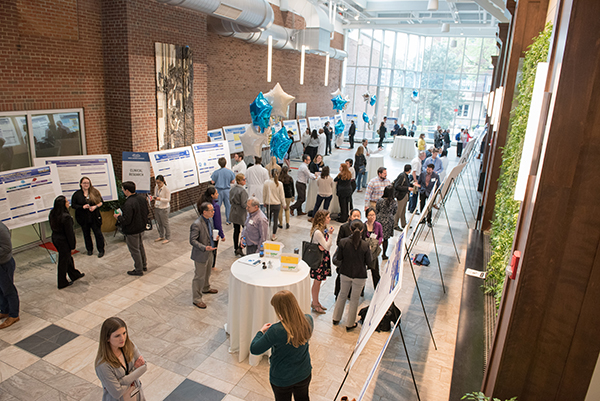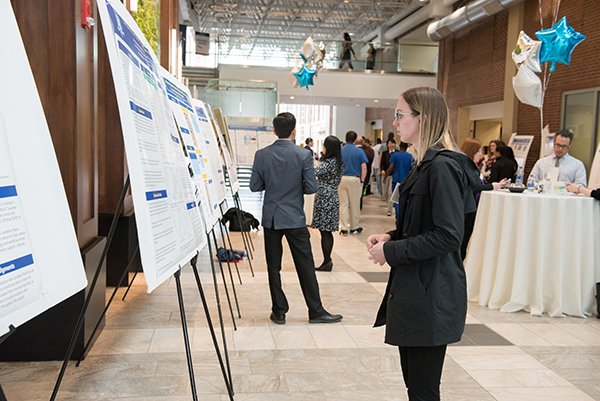Research in General Surgery
The department of surgery historically has had a tradition for clinical innovations, and visibility for clinical research with seminal paper in Vascular, Cardiothoracic, and Oncological surgery. Many departments in the HFHMG capitalized on the research enterprise to develop world class programs.
A hands-on research project enhances resident understanding of study design, complete and accurate data collection, statistical application to data, and the challenges of writing of a research paper. In addition, one-on-one mentoring, familiarization with research opportunities, and insight into a career in academic medicine are other benefits of research.
The General Surgery Residency Program focuses on helping each resident pursue research that aligns with their interest and helps them continue to grow academically. Trainees get involved in multiple clinical research projects at the beginning of residency under the direct mentorship of one of our surgical faculty. Every senior resident (PGY 3-5) is required to present one of their projects at the end of the academic year. The Resident Interest Committee (RIC) meets every other week so that researchers can update all on their progress and receive feedback from other residents and faculty. A yearly Medical Education Research Forum at Henry Ford Hospital gives the residents an opportunity to present their projects to the whole Henry Ford Healths community.
The program allows residents to participate in a dedicated research program spanning 1-2 years after the second or third clinical years to pursue a range of academic interests including basic science research, clinical outcomes research, additional degrees and/or clinical training. The Graduate Medical Education (GME) and General Surgery Departments work closely together to assist our trainees in tailoring their research experience to meet each resident's individual career goals. All our research residents present their work at major regional and national scientific conferences—where many win major awards for their work—and publish manuscripts in peer-reviewed journals. All research residents receive support to attend the Association for Academic Surgery Fundamentals of Surgical Research Course and Career Development Course, both of which are held immediately prior to the annual Clinical Congress of the American College of Surgeons.
There is a vast support network to assist our residents during their research endeavors:
- Public Health Sciences (PHS) department, offers epidemiologic and biostatistical support to all house officers. Support includes assistance with study design, proposal development, statistical analysis, and aid in the preparation of research abstracts and manuscripts for data analysis sections. PHS offers the "Health Disparities Research Collaborative (HDRC) New Investigator Award", a two-year program for physician scientists interested in conducting health disparities and patient-centered outcomes research.
- Scholarly support from the Henry Ford Hospital’s Sladen library including weekly group or one-to-one research training sessions, free access to licensed EndNote software, literature review requests, systematic review consultations, and manuscript preparation. In addition, Sladen Library provides assistance with professional editorial services provided by our senior medical writer to help with any level of editing/writing, from basic copyediting to higher-level language and content editing.
- Creative services department are a full-service graphic design, photography and video production that can aid with creation of video abstracts, tables, or diagrams for any research project.
- Medical Education Research Forum which is open to medical students, residents, and fellows. Awards are presented in the areas of medical and educational research, quality improvement, reducing healthcare disparities and case reports.
- GME Funds of up to $1,500 per trip for house officers presenting at conferences and meetings. In addition, GME offers a research grant of up to $5,000 to support house officer-driven research.
- In addition to having a close relationship with Wayne state University, Henry Ford Health in Detroit and Michigan State University in East Lansing have signed a nonbinding letter of intent to create a primary affiliation to share research and clinical care, increase health student education and develop a long-term plan to build a joint research institute in Detroit.
Pictures from the Henry Ford Hospital 16th Annual research symposium.


.svg?iar=0&hash=F6049510E33E4E6D8196C26CCC0A64A4)
/hfh-logo-main--white.svg?iar=0&hash=ED491CBFADFB7670FAE94559C98D7798)